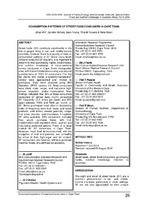| dc.description.abstract | Street foods (SF) contribute significantly to the diet of people living in low- and middle-income countries, however there is a paucity of data on consumption patterns of SF. Since many South Africans consume SF regularly, it is important to determine their purchasing habits, food choices, and nutrition knowledge. A cross-sectional survey conducted in Cape Town metropolitan area, with trained fieldworkers using a structured questionnaire on 1121 SF consumers. The first ten clients who visited a randomly-sampled SF vendor were approached and invited to participate. Data were analysed using IBM Statistics SPSS version 23. Most consumers were black, male, single, and had some high-school education and/or matriculated. Main findings indicated that 38% of these consumers consumed SF almost daily, 43.3% consumed SF frequently (2-3 times per week) and 29% spent between R600 and R899 per month on SF. Items purchased most often in descending order of frequency were fruit, foods and baked products, cold drinks, sweets, peanuts, crisps, fruit juice, biscuits, and chocolates. If healthier SF were available, 96% consumers indicated they would purchase these, with fruit, meat/chicken and vegetable stew, yoghurt and nuts being preferred options. There is a large market for SF consumers in Cape Town. However, most food items consumed, with the exception of fruit and peanuts, are unhealthy by virtue of their high sugar and fat content. SF consumers are however, willing to purchase healthier foods, should these be available. | en_US |

